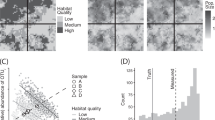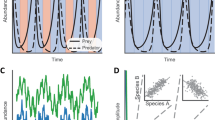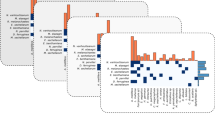Abstract
THE problem of subdivision of a population characterized by a correlation matrix obtained from a set of 2 × 2 contingency tables has recently been the subject of communications by Williams and his colleagues1,2. The basis of Williams's method is to choose that species which, by its presence or absence, subdivides the population of ecological observations in the most efficient manner possible. The purpose of this communication is to question the advisability of placing so much reliance on a single species, no matter how well selected.
This is a preview of subscription content, access via your institution
Access options
Subscribe to this journal
Receive 51 print issues and online access
$199.00 per year
only $3.90 per issue
Buy this article
- Purchase on Springer Link
- Instant access to full article PDF
Prices may be subject to local taxes which are calculated during checkout
Similar content being viewed by others
References
Williams, W. T., and Lance, G. N., Nature, 182, 1755 (1958).
Williams, W. T., and Lambert, J. M., J. Ecol., 47, 83 (1959).
Goodall, D. W., Aust. J. Bot., 1, 39 (1953).
Goodall, D. W., Aust. J. Bot., 2, 304 (1954).
Author information
Authors and Affiliations
Rights and permissions
About this article
Cite this article
HARBERD, D. Association-Analysis in Plant Communities. Nature 185, 53–54 (1960). https://doi.org/10.1038/185053a0
Issue Date:
DOI: https://doi.org/10.1038/185053a0
This article is cited by
-
The continuum concept of vegetation
The Botanical Review (1967)
Comments
By submitting a comment you agree to abide by our Terms and Community Guidelines. If you find something abusive or that does not comply with our terms or guidelines please flag it as inappropriate.



